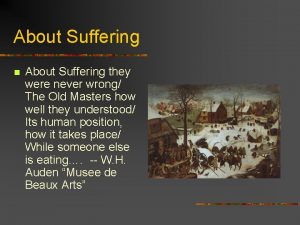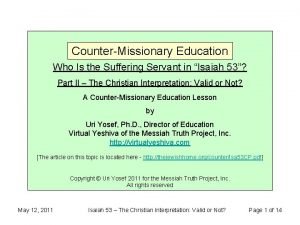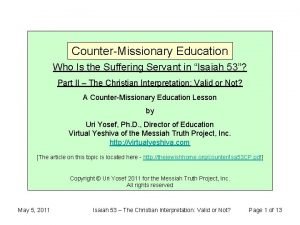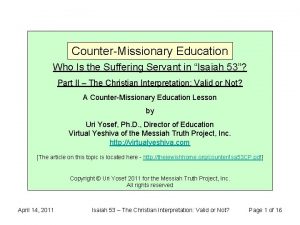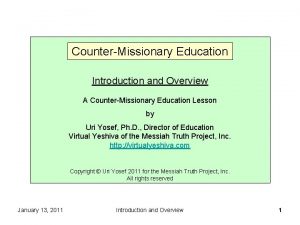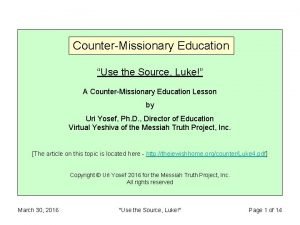CounterMissionary Education Who Is the Suffering Servant in





![Testing the New Hypothesis: Segment 2 (continued) U [New Testament] Question: Can Isaiah 53: Testing the New Hypothesis: Segment 2 (continued) U [New Testament] Question: Can Isaiah 53:](https://slidetodoc.com/presentation_image_h/0b5e957ef5076f3a743401f343ca3458/image-6.jpg)

![Testing the New Hypothesis: Segment 2 (continued) U [New Testament] Question: Can Isaiah 53: Testing the New Hypothesis: Segment 2 (continued) U [New Testament] Question: Can Isaiah 53:](https://slidetodoc.com/presentation_image_h/0b5e957ef5076f3a743401f343ca3458/image-8.jpg)

![Testing the New Hypothesis: Segment 2 (continued) U [New Testament] Question: Can Isaiah 53: Testing the New Hypothesis: Segment 2 (continued) U [New Testament] Question: Can Isaiah 53:](https://slidetodoc.com/presentation_image_h/0b5e957ef5076f3a743401f343ca3458/image-10.jpg)

![Testing the New Hypothesis: Segment 2 (continued) U [New Testament] Question: Can Isaiah 53: Testing the New Hypothesis: Segment 2 (continued) U [New Testament] Question: Can Isaiah 53:](https://slidetodoc.com/presentation_image_h/0b5e957ef5076f3a743401f343ca3458/image-12.jpg)

- Slides: 13

Counter-Missionary Education Who Is the Suffering Servant in “Isaiah 53”? Part II – The Christian Interpretation: Valid or Not? A Counter-Missionary Education Lesson by Uri Yosef, Ph. D. , Director of Education Virtual Yeshiva of the Messiah Truth Project, Inc. http: //virtualyeshiva. com [The article on this topic is located here - http: //thejewishhome. org/counter/Isa 53 CP. pdf] Copyright © Uri Yosef 2011 for the Messiah Truth Project, Inc. All rights reserved April 28, 2011 Isaiah 53 – The Christian Interpretation: Valid or Not? Page 1 of 13

Introduction New Hypothesis: The Messiah is the servant in "Isaiah 53" Testing of our new hypothesis continues in the Validation stage of the Scientific Method with the verse-by-verse analysis of Segment 2 – Isaiah 53: 1 -4. It was noted in Segment 1 that the Hebrew text of “Isaiah 53” will serve as our “proof text” for the analysis. The Christian interpretation asserts that the “voice” switches from God to the Jews as we transition from Segment 1 into Segment 2. Yet, according to the Hebrew text, and even its various translations, this cannot be true for the simple reason that at the end of Segment 1 God speaks of the surprised reaction by the nations and their kings at the commencement of the messianic era, and as Segment 2 begins, the startled leaders of those nations begin to express their astonishment. This conclusion is also supported from within the Hebrew Bible, which contains no accounts that describe the rejection of the Messiah by the Jews, and their bewildered reaction when, at some future time, they realize their mistake. April 28, 2011 Isaiah 53 – The Christian Interpretation: Valid or Not? Page 2 of 13

Segment 2 – Isaiah 53: 1 -4 The King James Version (KJV) translation is shown with pointers to cross-referenced passages in the New Testament. These references are taken from the New American Standard Bible (NASB). However, the corresponding passages below the table are quoted from the KJV for consistency. April 28, 2011 Isaiah 53 – The Christian Interpretation: Valid or Not? Page 3 of 13

Segment 2 – Isaiah 53: 1 -4 Cross-referenced passages for the table on Slide 3 April 28, 2011 Isaiah 53 – The Christian Interpretation: Valid or Not? Page 4 of 13

Verification Stage Testing the New Hypothesis: Segment 2 This verse relates how the nations and their kings, who were mentioned in the previous verse, will not see God's mighty arm of salvation until the messianic era commences, as Isaiah himself declares several verses earlier: Y [Hebrew Bible] Question: Can Isaiah 53: 1 apply to the Messiah? As was described in Part I, allusions in the Hebrew Bible to God’s “arm”, "hand", and “finger”, etc. , often are metaphoric references to God’s taking direct action and to His acts of vindication, and these are commonly used to point to the physical and spiritual redemption of the Jewish people. Such terms are never used in the Hebrew Bible as metaphors for the Messiah, neither is reference made anywhere else in the Hebrew Bible to the salvation of a suffering Messiah. Y [Hebrew Bible] Answer: NO! April 28, 2011 Isaiah 53 – The Christian Interpretation: Valid or Not? Page 5 of 13
![Testing the New Hypothesis Segment 2 continued U New Testament Question Can Isaiah 53 Testing the New Hypothesis: Segment 2 (continued) U [New Testament] Question: Can Isaiah 53:](https://slidetodoc.com/presentation_image_h/0b5e957ef5076f3a743401f343ca3458/image-6.jpg)
Testing the New Hypothesis: Segment 2 (continued) U [New Testament] Question: Can Isaiah 53: 1 apply to Jesus? This verse is cross-referenced with two verses in the New Testament, John 12: 38 and Romans 10: 16, both of which allege that the Jews who, even after having seen Jesus perform miracles, refused to accept him. But, how could this verse suddenly speak of the Jews, when the previous verse points to the startled kings of many nations? There are no such descriptions of Jews present in the Hebrew Bible and, therefore, adhering to the context, this is the "voice" of the leaders of the (Gentile) nations, as they begin to describe the extent of the astonishment. The authors of these two cross-referenced passages in the New Testament either misrepresented or misunderstood Isaiah's words and attributed them to the wrong "speakers". U [New Testament] Answer: NO! April 28, 2011 Isaiah 53 – The Christian Interpretation: Valid or Not? Page 6 of 13

Testing the New Hypothesis: Segment 2 (continued) The metaphors employed in this verse describe an entity that appeared on the scene but was not expected to survive or, if it survived, it was not going to grow into something beautiful that is desired by everyone. [Hebrew Bible] Question: Can Isaiah 53: 2 apply to the Messiah? Although the imagery of a young tree growing in dry and parched soil is used in reference to the Jewish people, it is never used in the Hebrew Bible to describe the Messiah. [Hebrew Bible] Answer: NO! April 28, 2011 Isaiah 53 – The Christian Interpretation: Valid or Not? Page 7 of 13
![Testing the New Hypothesis Segment 2 continued U New Testament Question Can Isaiah 53 Testing the New Hypothesis: Segment 2 (continued) U [New Testament] Question: Can Isaiah 53:](https://slidetodoc.com/presentation_image_h/0b5e957ef5076f3a743401f343ca3458/image-8.jpg)
Testing the New Hypothesis: Segment 2 (continued) U [New Testament] Question: Can Isaiah 53: 2 apply to Jesus? The New Testament depicts the handsome, charismatic, and wise Jesus constantly gaining popularity among ever growing multitudes. Even within Jerusalem itself, great multitudes were still loyal to Jesus as he was on his way to being crucified (Luke 23: 27). If that was true, how could the present verse possibly refer to the massive rejection of Jesus' message by the Jews at the time of his death? As it regards his followers outside of Jerusalem, they were probably unaware of these events and would not have rejected him at that time. Moreover, with some 2/3 rd of the world's Jewry in the first century C. E. living outside the Land of Israel, it is also likely that the majority of his Jewish contemporaries in the Diaspora never even heard of Jesus. Even the well-known Jewish historian Philo of Alexandria [20 B. C. E. -50 C. E. ], a contemporary of Jesus, never mentioned him in his works. Clearly, the rejection of Jesus by the Jews was not yet an issue at the time of his death. U [New Testament] Answer: NO! April 28, 2011 Isaiah 53 – The Christian Interpretation: Valid or Not? Page 8 of 13

Testing the New Hypothesis: Segment 2 (continued) This verse describes a pathetic entity, forsaken and afflicted with sickness, being despised by the multitudes that could not even bear to look at it. [Hebrew Bible] Question: Can Isaiah 53: 3 apply to the Messiah? Descriptions of the Messiah as being forsaken, sickly, and despised by all are not found anywhere in the Hebrew Bible. [Hebrew Bible] Answer: NO! April 28, 2011 Isaiah 53 – The Christian Interpretation: Valid or Not? Page 9 of 13
![Testing the New Hypothesis Segment 2 continued U New Testament Question Can Isaiah 53 Testing the New Hypothesis: Segment 2 (continued) U [New Testament] Question: Can Isaiah 53:](https://slidetodoc.com/presentation_image_h/0b5e957ef5076f3a743401f343ca3458/image-10.jpg)
Testing the New Hypothesis: Segment 2 (continued) U [New Testament] Question: Can Isaiah 53: 3 apply to Jesus? There are two major issues here: • The description of the servant in this verse, conflicts with New Testament accounts that describe Jesus: - In his youth, he was loved by all (Luke 2: 40, 47, 52) - He was a popular preacher (Mark 3: 7 -9) - He was "praised by all" (Luke 4: 14 -15) - He is followed by multitudes who acclaim him as a prophet (Matthew 4: 25, 21: 9 -11) - Fearing “a riot of the people”, the Romans had to spirit him away to be crucified (Mark 14: 1 -2) • Nowhere in the New Testament is Jesus described as having been afflicted with disease and pain. If he were in this condition, why would God have chosen to put Himself into such an afflicted and decrepit body? Moreover, how could Jesus qualify as an "unblemished sacrifice" being in such an "imperfect" body? U [New Testament] Answer: NO! April 28, 2011 Isaiah 53 – The Christian Interpretation: Valid or Not? Page 10 of 13

Testing the New Hypothesis: Segment 2 (continued) This verse continues to elaborate on the perceived condition of the servant. Not only is this pathetic entity afflicted with illnesses and pains, it was regarded as having been plagued, oppressed, and smitten at the hand of God. [Hebrew Bible] Question: Can Isaiah 53: 4 apply to the Messiah? The Messiah is never described in the Hebrew Bible in these terms, and certainly not as someone smitten by God. As the one who will preside over the execution and completion of the messianic agenda, he will be blessed by God, and will be a greatly respected and powerful leader. [Hebrew Bible] Answer: NO! April 28, 2011 Isaiah 53 – The Christian Interpretation: Valid or Not? Page 11 of 13
![Testing the New Hypothesis Segment 2 continued U New Testament Question Can Isaiah 53 Testing the New Hypothesis: Segment 2 (continued) U [New Testament] Question: Can Isaiah 53:](https://slidetodoc.com/presentation_image_h/0b5e957ef5076f3a743401f343ca3458/image-12.jpg)
Testing the New Hypothesis: Segment 2 (continued) U [New Testament] Question: Can Isaiah 53: 4 apply to Jesus? The cross-reference to this verse at Matthew 8: 17 promotes the notion of vicarious punishment, which is strictly forbidden in the Hebrew Bible, and leads to an unfortunate misinterpretation of Isaiah 53: 4. Nowhere in the New Testament is Jesus described as being sickly, oppressed, and smitten by God. According to accounts in the New Testament, while on the cross, Jesus complained to God about being forsaken (Matthew 27: 46; Mark 15: 34). Yet, according to King David, God does not forsake a righteous person: If the accounts in the New Testament are accurate and Jesus was forsaken by God, then they give rise to several questions. If, as most Christians believe, Jesus, as part of the godhead, was God, then ask yourself: - How could God possibly forsake Himself? - How could God not have been able to help Himself while on the cross? - How could Jesus have been righteous when he claimed to have been forsaken by God? U [New Testament] Answer: NO! April 28, 2011 Isaiah 53 – The Christian Interpretation: Valid or Not? Page 12 of 13

Interim Summary – Segment 2: Isaiah 53: 1 -4 Our new hypothesis: New Hypothesis: The Messiah is the servant in "Isaiah 53" Results of the verse-by-verse testing: April 28, 2011 Isaiah 53 – The Christian Interpretation: Valid or Not? Page 13 of 13
 Isaiah 53 the suffering servant
Isaiah 53 the suffering servant Parable of the suffering servant
Parable of the suffering servant Difference between public servant and civil servant
Difference between public servant and civil servant About suffering they were never wrong
About suffering they were never wrong Hardship and suffering during the depression
Hardship and suffering during the depression Patience in suffering james 5
Patience in suffering james 5 Half formed ghost
Half formed ghost Painless killing of a patient suffering
Painless killing of a patient suffering Joy amidst suffering
Joy amidst suffering Hundred agonies in black and white
Hundred agonies in black and white Endless suffering
Endless suffering Job's response to suffering
Job's response to suffering Christian response to suffering
Christian response to suffering Pulse stuffing
Pulse stuffing



